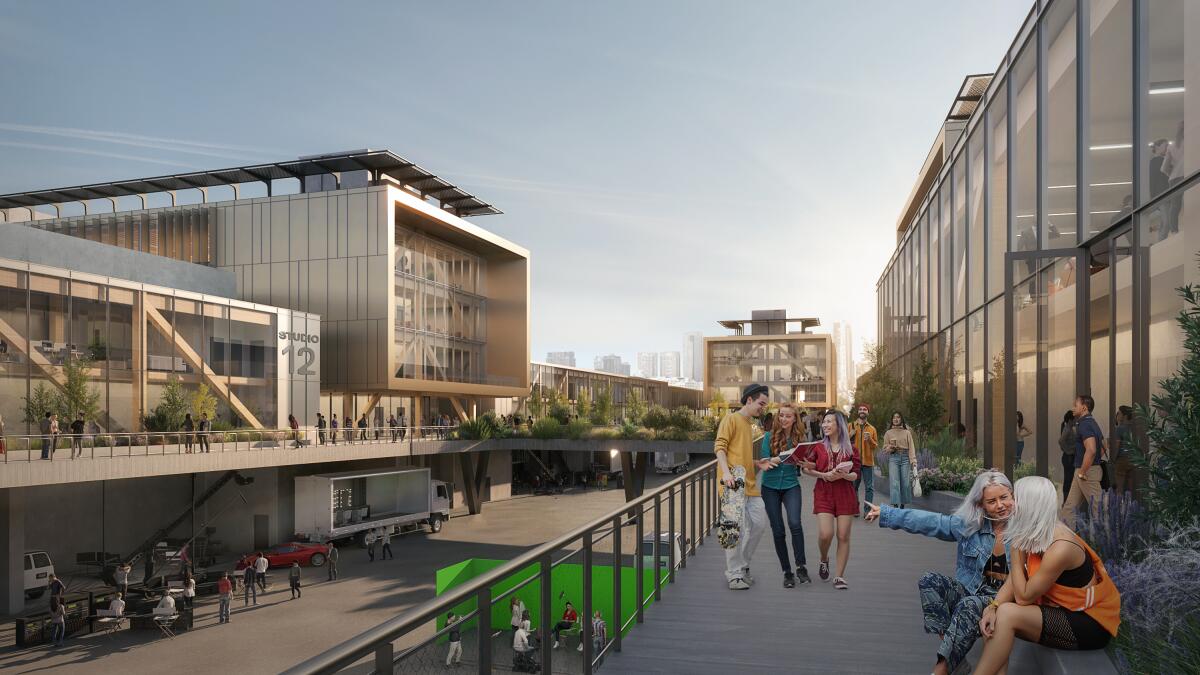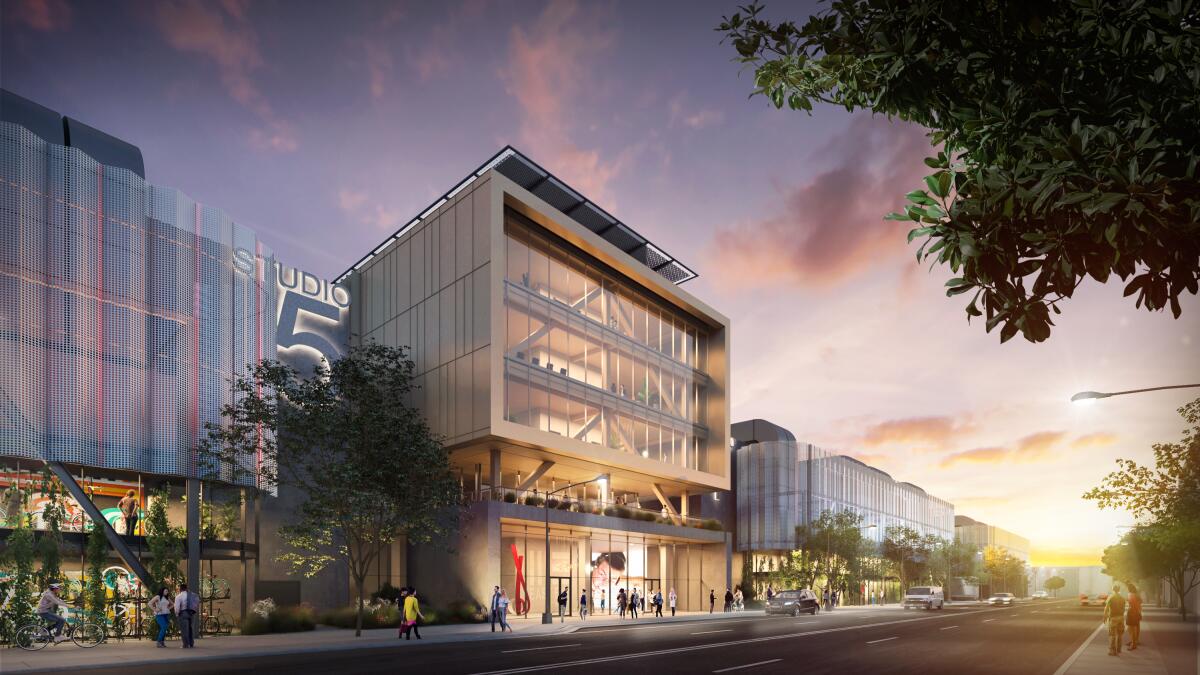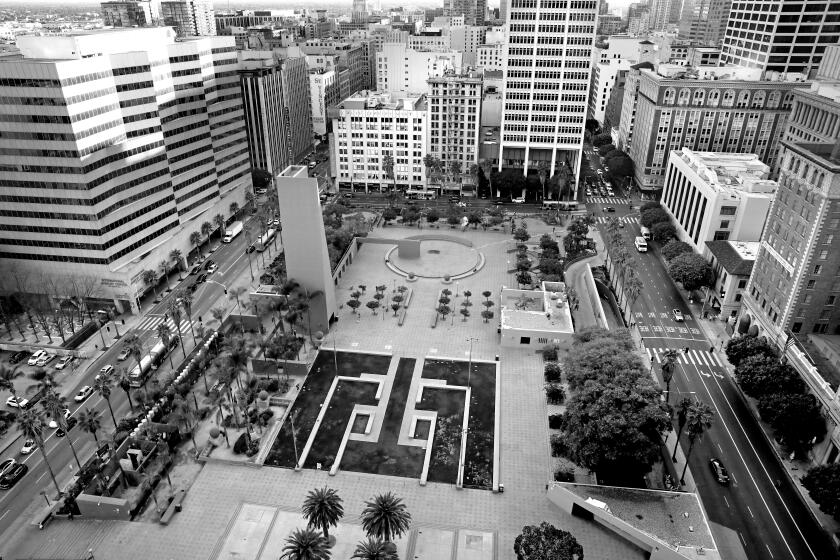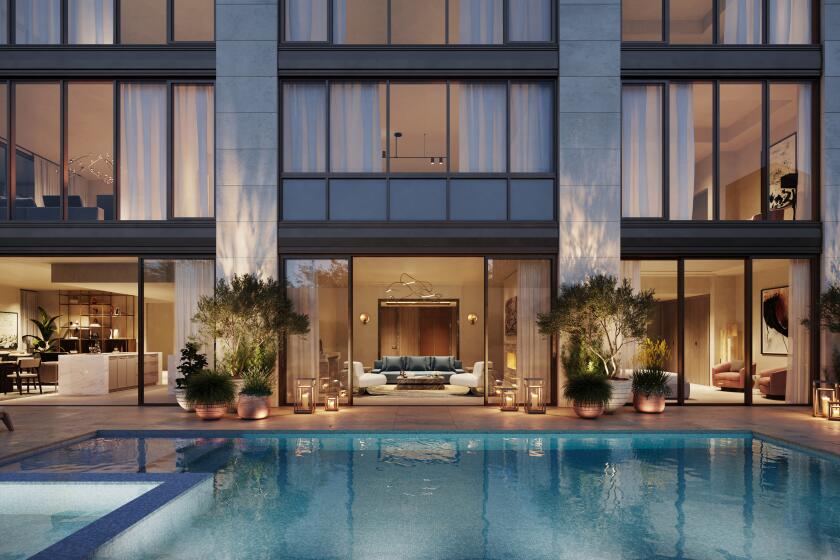A big studio complex is planned for downtown L.A.’s Arts District

- Share via
With movie and television production surging, a warehouse property near the newly famous 6th Street bridge in downtown Los Angeles is set to be turned into an $800-million studio to serve the entertainment industry.
East End Studios will submit an application to the city Monday to build a studio on 15 acres at 6th and Alameda streets where streaming services and other entertainment creators could make TV shows and movies.
With 16 soundstages, East End Studios’ ADLA Campus would be one of the larger studio projects in the pipeline for Los Angeles County, where several developers are rushing to add new facilities to meet demand.
Existing soundstages in the county have been almost fully rented for years, which can make it hard for new productions to find places to work, said Paul Audley, president of FilmLA, the nonprofit that handles film permits in the region.
“We’ve seen streaming growing at an average rate of 35% a year,” he said. “Even if that backs off, which some people are now predicting, we still don’t have enough stage space to deal with that.”
In addition to the soundstages, the ADLA Campus would include four office buildings with a combined total of nearly 300,000 square feet of offices and more than 100,000 square feet of production support space. All the facilities would be for rent, perhaps to a single tenant such as a large streaming service.

With as many as 1,000 people working there on a given day, the studio could inject some street life into a part of the Arts District that retains much of its historical use as an industrial center, said Shep Wainwright, managing partner of Los Angeles-based East End Studios. The ADLA Campus would replace a pair of produce distribution warehouses and surface parking.
The design calls for office buildings and landscaping to face the sidewalk, a more publicly open style than is found in many historic studios that are isolated from their surrounding neighborhoods.
Past studio construction often called for high concrete walls, creating “fortresses,” Wainwright said, that revealed little to outsiders about what was going on inside.
“We’re saying that we don’t have to hide, it’s OK to know this is a studio,” he said. “We’re trying to engage with the street in a way that’s more pleasing to the neighborhood.”
Plans call for a public open space on Mill Street, the eastern boundary of the studio. Getting into the studio would still require passing through security checks, but Wainwright hopes that people working there will find it appealing to walk outside and head to lunch at neighborhood restaurants.
Work from home is what many employees want. But employers still want you back in the office
The design by London-based architecture firm Grimshaw is intended to stack the elements commonly found in a suburban-style studio campus into an urban setting.
Grimshaw architect Andrew Byrne described the style as “campus on top,” in which people could collaborate and move about on landscaped outdoor terraces above while vehicles move below between soundstages and production base camps where trucks, equipment and actors’ trailers are placed. Most of the parking would be underground.
The developers hope to secure city approval for the ADLA Campus within two years and complete it two years after that. It’s the fifth and largest entertainment development for East End Studios, which has a project in New York and four others in the Los Angeles area, including Glendale.
One of them is near the ADLA Campus across the recently opened 6th Street Viaduct, a $588-million span connecting the Arts District to the historic Eastside and Whittier Boulevard. At Jesse Street and Mission Road, East End Studios plans to build a facility with five soundstages.
The studio projects are part of a wave of development that includes nearby downtown competitor 8th & Alameda Studios on the site of the current Los Angeles Times printing plant. That planned project would eventually have 17 soundstages on 26 acres.
A $100-million boutique condominium complex with private swimming pools for residents and a potential five-star restaurant is rising in Beverly Hills.
FilmLA is tracking 14 new studio projects in Greater Los Angeles including new stages and other facilities at the Universal Studios lot and a $1.25-billion overhaul of the former CBS Television City.
Other substantial developments include the redevelopment of Warner Bros. Ranch in Burbank and a new seven-soundstage complex called Sunset Glenoaks Studios in the Sun Valley neighborhood of Los Angeles.
If all of these projects are built, the count of certified stages in the region would increase by about 27%, FilmLA said, and the total square footage of stages would grow “by an unknown but considerable sum.” Los Angeles County has 5.4 million square feet of certified stage space in 398 stages.
While Southern California has the largest inventory of production space in the world, competing cities and countries are adding large, technologically advanced facilities that L.A. needs to match, Audley said.
“Some of our stages are close to 100 years old,” Audley said, “and their internal infrastructure needs improving.”













